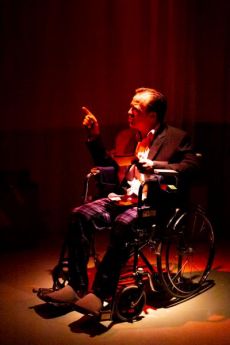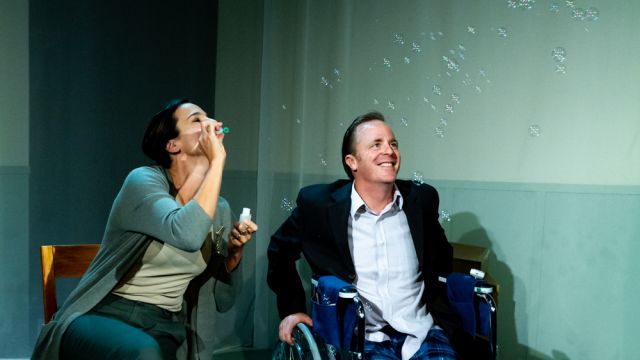Wakey Wakey
An alarm wakes a man, Guy (Justin Hosking). ‘Is it now?’ he says. ‘I thought I had more time.’ This is a play about dying and resisting dying and clinging to what constitutes – good or bad – being alive. The title, Wakey Wakey, might be an admonishment to us: ‘Wake up – you may think you have ‘more time’, but…
Running at around seventy-five minutes, it begins and continues with Guy in a wheelchair, in some sort of limbo, surrounded by gauzy curtains and lined with taped-up cardboard boxes – as if someone has just moved in or is just about to move out – or indeed to discard a whole lot of stuff no longer required. And it is the last, as Guy tells us. (Design is by James Lew.)
Guy speaks directly to the audience in a forty-minute (maybe longer – it seems longer) monologue. In itself, that’s an achievement: to be alone on stage, in a wheelchair, delivering a more or less stream of consciousness presentation. Guy intersperses his reflections on his own life and on Life in general with sort of self-help advice and aphorisms on filing cards, word games, quips, photographs, a video of howling animals, including Pavarotti, short bursts of music that he says are to have certain effects on us and – more obviously seriously – a request for us to think about someone in our lives to whom we are grateful, living or dead. Mr Hosking works hard to make us care about Guy. It shouldn’t be hard - Mr Hosking has a very likeable persona – but here, no doubt directed by David Myles, he makes Guy too nice, so to speak; there’s emotion but not much light and shade. It’s curiously alienating; he’s ingratiating in a way that’s almost a deterrent. The effect is probably just what Will Eno wants to avoid: sentimentality. But Mr Eno characteristically reminds us that this is, after all, a play. ‘Sorry, I don’t know exactly what to say to you,’ Guy says. Then he continues, ‘I wonder how you hear that… What do you make of the fact that this event, painstakingly scripted, rehearsed, designed and directed, features someone saying, “I don’t know exactly what to say to you.”’ How are we to hear that? Is it a sort of break-the-fourth-wall alienation thing, or just smarty-pants?
 Productions of Wakey Wakey in the United States were greeted with emotion, admiration and respect – and maybe will be here. Critics and, apparently, audiences were impressed by Will Eno’s elliptical, poetic dialogue, and moved by the depiction of a man with a terminal illness contemplating death. (It is difficult to be disrespectful about a play in which a man is dying.) Ben Brantley in The New York Times said that in this play ‘dying is a stand-up routine’ that ‘incorporates all the familiar and inadequate responses’ that people make towards death; that it presents a ‘Beckettian sense of human existence’. In this Red Stitch production, I’m not sure that the play rises to such heights. In fact, I’m not sure that the play itself rises to such heights.
Productions of Wakey Wakey in the United States were greeted with emotion, admiration and respect – and maybe will be here. Critics and, apparently, audiences were impressed by Will Eno’s elliptical, poetic dialogue, and moved by the depiction of a man with a terminal illness contemplating death. (It is difficult to be disrespectful about a play in which a man is dying.) Ben Brantley in The New York Times said that in this play ‘dying is a stand-up routine’ that ‘incorporates all the familiar and inadequate responses’ that people make towards death; that it presents a ‘Beckettian sense of human existence’. In this Red Stitch production, I’m not sure that the play rises to such heights. In fact, I’m not sure that the play itself rises to such heights.
As it goes on the pathos increases, but instead of caring for Guy, we are somewhat bemused – and even embarrassed for him in his attempts to be ‘entertaining’. We find ourselves waiting for something to happen. It is certainly sad as it suggests (inadvertently?) what a thin, banal and maybe lonely life Guy has had. We learn very little of the specifics of his life, including, apparently, any intimate connection he might have had with any other human being. What really is moving are his sudden lapses into paralysed silence, when his illness freezes his brain and he can’t complete a thought. Then we see a human being in extremis – and death is dramatised.
But we also get faux profundities, such as this on ‘bravery’, ‘When you’re around it, it just seems like kindness, even happiness, like a little kid eating an ice-cream. It’s very quiet, true bravery.’ This, surely, is nonsense, and at such moments we wonder, as we sometimes do with Mr Eno, whether he is feeling for his character or laughing at him.
In any case, we are, I think, very relieved when Guy is finally joined on stage by a nurse/carer, Lisa (Nicole Nabout). Ms Nabout has grace, warmth and a certain poise, and she generates sympathy for Guy because she feels it – albeit in a reserved, professional way. This does not exempt her, however, from some dubious aphorisms – but they may be intended to show the inadequacy of offering ‘comfort’.
 Mr Eno’s The Realistic Joneses (produced by Red Stitch in 2017) - his attempt, he said, to write a ‘naturalistic play’ - concerns two couples who seek desperately to communicate… and fail, but in their attempts convey depths of thought and emotion. The result is very moving indeed. As it happens, that Red Stitch production also featured Mr Hosking. He was heartbreaking, perhaps because he had to appeal to another character and not carry the burden of appealing to an audience.
Mr Eno’s The Realistic Joneses (produced by Red Stitch in 2017) - his attempt, he said, to write a ‘naturalistic play’ - concerns two couples who seek desperately to communicate… and fail, but in their attempts convey depths of thought and emotion. The result is very moving indeed. As it happens, that Red Stitch production also featured Mr Hosking. He was heartbreaking, perhaps because he had to appeal to another character and not carry the burden of appealing to an audience.
I wonder at certain contemporary – and much awarded – American playwrights, such as Mr Eno, Anne Washburn, Young Jean Lee and Annie Baker, who seem compelled to be so reductive of their characters and thus suggest so limited and reductive a picture of contemporary life. Is it a sort of elitist sneering, or a kind of despair?
Michael Brindley
Photographer: Teresa Noble
Subscribe to our E-Newsletter, buy our latest print edition or find a Performing Arts book at Book Nook.

